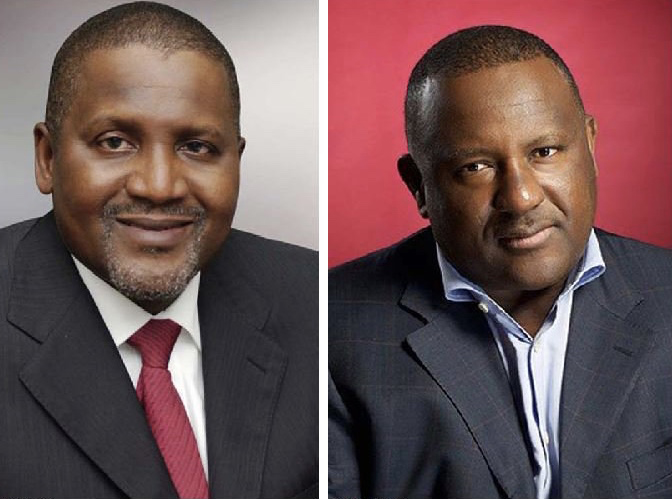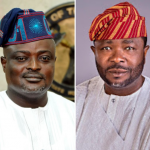...To get all news updates, Join our WhatsApp Group (Click Here)
Also Join our WhatsApp Channel (Click Here)
The feud between Abdul Samad Rabiu’s BUA Group and Aliko Dangote’s Dangote Group is taking an interesting turn, as BUA Group described the publication of Dangote Group wherein it stated that BUA misinterpreted the fact about a pending court case as untrue and laden with fraught misrepresentations.
A statement by BUA Group explained that Dangote, in its hurry to twist facts, failed to justify the alleged misinterpretation in its publication but stylishly stated that it has appealed the judgement whilst accepting the recent court order, which granted BUA the right to peaceful possession and operations of three of its mining sites in Obu, Okpella in Edo State.
“In the said publication by Dangote Group, it was alleged that the initial publication of the BUA Group was riddled with misrepresentations and deliberate distortions of facts. We however note that the Dangote Group failed to identify any specific fact, which was distorted. On the contrary, the Dangote Group reiterated the fact that the judgment of the Court indeed restrained DIL and the other
Respondents, as contended by BUA, albeit stating that the judgment of the Court constitutes complete aberrations and contains manifests contradictions; and it has exercised its legal right to appeal the decision of the Court. Whilst we consider this attempt to disparage the Court on the pages of print media as an affront, we shall not be joining issues with the Dangote Group, as we are of the view that the Court can protect itself and DIL reserves the right to appeal the decision of the Court.
Dangote Group frowned at the right of BUA to institute the BUA Fundamental Right Suit on the basis that it was a clear abuse of court process as there are two other pending suits – the BUA Suit and Suit No. FHC/B/CS/74/2016: Dangote Industries Limited & Anor. v. BUA International Limited & Ors (“Dangote Suit”).
It is worty to note that the Dangote Group ironically commenced the Dangote Suit during the pendency of the BUA Suit. Moreover, it is trite law that any fundamental right suit is an independent claim, which does not impede a pending dispute. In this instance, the suit was deemed necessary in view of Dangote Groups use of the Nigeria Police Force to disrupt the possessory right of BUA Group and to safeguard the lives of BUA Group’s employees.
The Court confirmed this in the BUA Fundamental Rights Suit where it was stated: “that the 1st and 2nd Respondents (Police) allowed themselves to be used by the 3rd and 4th Respondents (DIL and Dangote Cement)”
It is imperative to note that the Dangote Group’s use of the Nigeria Police Force to disrupt BUA’s operations was done brazenly after DIL had applied to Court for a restraining order against BUA in Suit No. FHC/B/CS/74/2016, which was granted ex parte, but set aside by the Court upon a robust challenge by BUA.
Interestingly, the Dangote Group did not deny resorting to self-help in its publication. It is our contention that no one should be above the law, no matter how highly placed, powerful or influential as the rule of law is the pillar and foundation of any democracy.
BUA further corrected Dangote on it claim that BUA was granted its mining lease from the Governor of Edo State restating that the authority to grant a mining license is within the sole jurisdiction of the Ministry of Mines and Steel Development through the Nigeria Mining Cadastre Office, which granted the BUA licenses.
BUA also dismissed Dangote’s claim to BUA’s mining sites in Edo as absurd and frivolous as Dangote’s mining license was granted under Kogi State while BUA licenses and mining sites respectively cover and are located in Obu, Okpella in Edo State.
With respect to the Dangote Group’s interpretation of the consequence of its Appeal of the decision of the Court, it is trite law that an Appeal does not amount to a stay of execution, and the Dangote Group is only being mischievous by suggesting that BUA is refrained from taking benefit of the judgment, which was in BUA’s favor.
As held by the Supreme Court in the case of Tai Ajomale v. Yuduat and Anor (1991) All N.L.R. 197:
“The successful litigant is prima facie entitled to the fruits of the judgment in his favour, it is expressly provided in Section 24 of the Supreme Court Act, 1960, that an appeal does not operate as a stay of execution.”
“The Courts have also reiterated the position of law in the case of Enabulele v. Agbonlahor (1994) 5 NWLR (PT. 342) 112 at P125, where it was held that:
“It is trite law that under Section 18 of the Court of Appeal Act, 1976, the filing of a Notice of Appeal does not operate as a stay of execution since the Court will not normally deprive a successful party of the fruits of his successful litigation”
BUA Group will not join issues with Dangote as the intention of its publication was to inform its shareholders and other stakeholders of the judgment of the Federal High Court which granted BUA’s and not commence a media trial.
According to the statement titled: RE: BUA OBU MINES, OKPELLA EDO STATE, it read: “We read with dismay the publication by the Dangote Group which purports to “set the records straight” with regards to the earlier publication of the BUA group on the recent judgment of the Federal High Court in Suit No. FHC/B/CS/101/2017: BUA v. IGP & Ors. (“BUA Fundamental Right Suit”), which restrains Dangote Industries Limited (“DIL”) and other Respondents in the suit from interfering in BUA Group’s mining sites in Obu, Okpella, Edo State.
“In the said publication by Dangote Group, it was alleged that the initial publication of the BUA Group was riddled with misrepresentations and deliberate distortions of facts. We however note that the Dangote Group failed to identify any specific fact, which was distorted. On the contrary, the Dangote Group reiterated the fact that the judgment of the Court indeed restrained DIL and the other Respondents, as contended by BUA, albeit stating that the judgment of the Court constitutes complete aberrations and contains manifests contradictions; and it has exercised its legal right to appeal the decision of the Court.
Whilst we consider this attempt to disparage the Court on the pages of print media as an affront, we shall not be joining issues with the Dangote Group, as we are of the view that the Court can protect itself and DIL reserves the right to appeal the decision of the Court.
“Paradoxically, the Dangote Group’s publication was fraught with untrue statements, which it touted as the facts of the matter in an attempt to misinform the general public. Accordingly, we seek to clarify the fallacies as follows:
Title to Mining Sites
“The Dangote Group alleged that BUA claims to have been granted its mining licenses from the Governor of Edo State. In this regard, it is imperative to note that BUA has never contended that the Governor of Edo State granted its licenses, as the authority to grant a mining license is within the sole jurisdiction of the Ministry of Mines and Steel Development through the Nigeria Mining Cadastre Office, which granted the BUA licenses.
Further, both the Hon. Minister of Mines and Steel Development and the Nigeria Mining Cadastre Office are defendants in Suit No. FHC/B/CS/7/2016: BUA International Limited & Anor. v. Hon. Minister of Mines and Steel Development (“BUA Suit”), wherein BUA asserts its legal and beneficial ownership of the mining sites.
“Further, the Dangote Group explicitly asserted that BUA does not have any right to the mining sites on the basis of the response of the Director-General of the Mining Cadastre Office to BUA’s application to renew its licenses. Needless to say, the Director-General’s ministry and parastatal are also Defendants in the BUA Suit pending in Court and the reaction is therefore not surprising.
“We wish to state clearly that the mining license granted to Dangote Group explicitly states that the location is in Kogi State, Nigeria, while the BUA licenses and mining sites respectively cover and are located in Obu, Okpella, Edo State, Nigeria.
The Dangote Group’s attempt to lay claim to mining sites not within a geographical area covered by its license is therefore ludicrous.
“The general public is therefore advised that Dangote Group’s claims are nothing but an attempt to unilaterally determine the outcome of the very matter the Court has been approached to determine in Suit No. FHC/B/CS/7/2016 – BUA Suit, which is still pending”.
Legal Precedence
The Dangote Group also questioned the right of BUA to institute the BUA Fundamental Right Suit on the basis that it was a clear abuse of court process as there are two other pending suits – the BUA Suit and Suit No. FHC/B/CS/74/2016: Dangote Industries Limited & Anor. v. BUA International Limited & Ors (“Dangote Suit”). This is notwithstanding that the Dangote Group itself ironically commenced the Dangote Suit during the pendency of the BUA Suit. Moreover, it is trite law that any fundamental right suit is an independent claim, which does not impede a pending dispute.
In this instance, the suit was deemed necessary in view of Dangote Groups use of the Nigeria Police Force to disrupt the possessory right of BUA Group and to safeguard the lives of BUA Group’s employees. Indeed, Court confirmed this in the BUA Fundamental Rights Suit where it was stated: “that the 1st and 2nd Respondents (Police) allowed themselves to be used by the 3rd and 4th Respondents (DIL and Dangote Cement)”
It is imperative to note that the Dangote Group’s use of the Nigeria Police Force to disrupt BUA’s operations was done brazenly after DIL had applied to Court for a restraining order against BUA in Suit No. FHC/B/CS/74/2016, which was granted ex parte, but set aside by the Court upon a robust challenge by BUA. Interestingly, the Dangote Group did not deny resorting to self-help in its publication.
It is our contention that no one should be above the law, no matter how highly placed, powerful or influential as the rule of law is the pillar and foundation of any democracy. “With respect to the Dangote Group’s interpretation of the consequence of its Appeal of the decision of the Court, it is trite law that an Appeal does not amount to a stay of execution, and the Dangote Group is only being mischievous by suggesting that BUA is refrained from taking benefit of the judgment, which was in its favor. As held by the Supreme Court in the case of Tai Ajomale v. Yuduat and Anor (1991) All N.L.R. 197:
“The successful litigant is prima facie entitled to the fruits of the judgment in his favour, it is expressly provided in Section 24 of the Supreme Court Act, 1960, that an appeal does not operate as a stay of execution.”
“The Courts have also reiterated the position of law in the case of Enabulele v. Agbonlahor (1994) 5 NWLR (PT. 342) 112 at P125, where it was held that:
“It is trite law that under Section 18 of the Court of Appeal Act, 1976, the filing of a Notice of Appeal does not operate as a stay of execution since the Court will not normally deprive a successful party of the fruits of his successful litigation”
“We shall refrain from further joining issues on this particular matter as the intention of our initial publication was to inform our shareholders and other stakeholders of the judgment of the Federal High Court and not to commence a media trial with the Dangote Group”.
You can get every of our news as soon as they drop on WhatsApp ...To get all news updates, Join our WhatsApp Group (Click Here)
Also Join our WhatsApp Channel (Click Here)

















